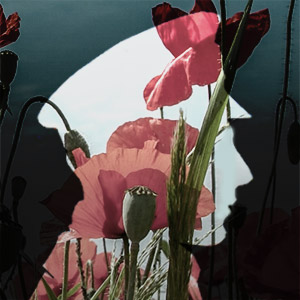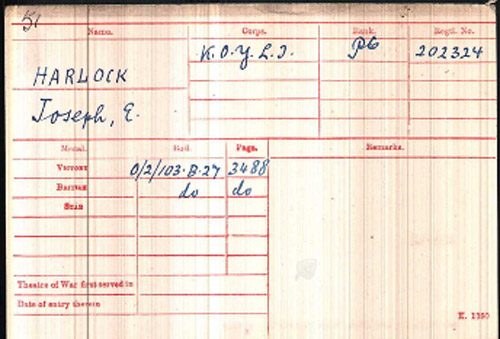
Joseph Edward Harlock was born in Ossett in June 1895, the only surviving son of Thomas Harlock and his wife Emma (nee Wilby), who married at South Ossett Christ Church on the 5th February 1894. The couple had another two sons, John who was born and died in March 1897, and Harry, born in June 1898 and died in the following March.
In 1901, Thomas, a labourer born in Burton-upon-Trent and Ossett born Emma were living on Dale Street with Joseph Edward. In September 1908 Thomas Harlock died, aged 45, leaving Emma a widow, aged 39, with her young son, aged 13. By 1911 Emma and Joseph Edward, an errand boy, had moved to 2, Lands Fold, Ossett.
On the 16th January 1916, Joseph enlisted in the army at Salisbury Plain where he joined the King’s Own Yorkshire Light Infantry (KOYLI) with service number 202324. He was 20 years and 7 months of age, 5’ 2¼” tall, a 33” chest measurement, a carter by trade and living at 2, Lands Fold, Town End, Ossett with his mother Emma, whom he named as his next-of-kin.
Private Harlock was posted to the Army Reserve until the 19th March 1916, when he was mobilised, and posted to the 2/4th Battalion of KOYLI, ‘at home’ until the 14th January 1917. He embarked for France the following day. Joseph Edward served in France with 2/4 KOYLI until the 18th November 1917 when he picked up his ticket for ‘Blighty’ and returned home on the 19th November.
At Grove Military Hospital, Tooting, London on the 29th December 1917, he underwent a thorough medical examination, which concluded that he suffered from vascular disease of the heart (V.D.W.), causing dyspepsia and palpitations on exertion. Private Harlock dated his problem to October/November 1917, when he was serving at Ypres, suffering from a shortage of breath and spitting blood, which he reported on the 12th November 1917. He was then found to have a regurgitation complaint and dilation of the heart and was sent to England for further diagnosis and treatment.
The medical examination also reported a previous history of chronic cough and dyspepsia on walking fast or running concluding that Private Harlock’s illness was aggravated by his army service. His current condition caused him to suffer from dyspepsia after walking five or six yards and then he had to rest for a few minutes. The examination report concluded that the disability was caused in action, on field service and on duty and that it was not a result of, but was aggravated by, service during the present war.
The Medical Board concluded that Private Joseph Edward Harlock was therefore physically unfit for army service. On the 19th January 1918, he was formally discharged on grounds of being ‘no longer physically fit for War Service’ and was not to be compulsorily posted for Service under the Military Service Act, 1917. He had completed two years and six days in the army.
On 15th July 1918 Joseph Edward Harlock, passed away at his home, 2 Lands Fold, Ossett. He was 23 years of age and the death certificate informs that he was “a teamer and discharged soldier”. An Inquest, held the day following his death, was conducted by the Coroner of the West Riding, Mr. Pelham P. Maitland and concluded that the cause of death was influenza and heart disease. Three weeks later on the 5th August 1918, a Silver War Badge was issued to Joseph Harlock at 2, Lands Fold, Town End, Ossett and acknowledged by his mother, Emma. The Silver War Badge was awarded to all of those military personnel who had served at home or overseas during the war, and who had been discharged from the army under King’s Regulations. The sterling silver lapel badge was intended to be worn in civilian clothes. It had been the practice of some women to present white feathers to apparently able-bodied young men who were not wearing the King’s uniform.
By 1918, Emma Harlock had lost her father when she was 17, her husband in his forties, and two of her children before they reached their first birthday. Now, with the death of her only living son, Joseph Edward, she had lost all that remained of her family.
In May 1919 Emma Harlock, as Joseph’s next of kin, was required to complete the usual army return notifying the names and details of the deceased’s close relatives including his mother, father, brothers and sisters. Emma’s name was the only one returned.
Most Silver War Badges were accompanied by a King’s Certificate although strictly these were issued subject to separate regulations. This Certificate was sent to Joseph Edward on 9 September 1920, two years after his death. He was also posthumously awarded the British and Victory medals, which were received by Emma in February 1922, shortly before her death, at the age of 55, in December 1922.

Joseph Edward Harlock’s Medal Index Card confirming the award of the British & Victory Medal.